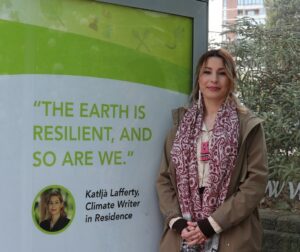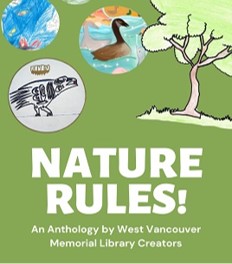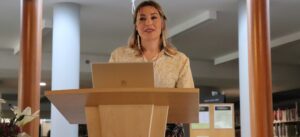It was an absolute honor to serve as the inaugural Climate Writer in Residence at the West Vancouver Memorial Library these past few months. I would like to take the time in this last blog to share with you some of the highlights.

Our book clubs were a great way to kick off the programming. For the Braiding Sweetgrass discussion, we invited Ts’ouke Elder Jeff Welsh to teach participants about the importance of cedar and how to cleverly create a rose out of a dried strip of cedar that was harvested and traded just for the occasion. Out of this grew an ongoing relationship with Jeff, and we will be documenting his process of gathering cedar in late spring and sharing with the video with Library.
The Indigenomics book club brought together a group of readers who were interested in how to make small changes in their community. Some ideas that came out of the visit were that local grocers should educate buyers on their purchases and give consumers more incentive to want to buy local. We also had an open discussion about the intersection between climate and the economy and what it is going to take to make sure that Indigenous peoples have a seat at the economic table in order to address climate change.
We were also lucky to have an in-depth conversation with Monique Gray Smith on her adaptation of Braiding Sweetgrass. At first, I thought that the adaptation was going to be a fictional rendition with characters come to life, but instead it is a non-fiction adaptation for younger readers with beautifully illustrated visuals created by Nicole Reinhardt. The book will be set in a more interactive tone and will be released this fall.

A group of young aspiring writers joined together to create an anthology that cover many aspects of climate change, from saving the trees in the Amazon, to chameleons, gorillas, wheat fields, glaciers, fish, bears, wolves and significant temperature changes. The 13 participants crafted beautiful, clever masterpieces all on their own, with helpful suggestions and prompts along the way. Ranging in age from 8 to 13, each student worked hard on their stories and in just four days they spun a story from only their imaginations. From start to finish they were engaged and excited about how their stories were progressing. Some students opted to do their own illustrations and graphic designs, which have informed the cover and pages within. It was a joy to be a part of this experience and help guide the Tell Your Story program participants in their journey of exploring what nature as character means for them. In giving voice to nature through their writing, the students were able to capture and portray the scope of the project successfully. They also were able to learn some helpful tips on how to take care of themselves if experiencing climate anxiety and what they can do in playing their part in protecting the planet. Stay tuned in the Library catalogue for a copy of the “Nature Rules” anthology.
I also had the opportunity to meet with grade six students at Westcot Elementary who really held me to task with their scientific questions on the climate emergency. We must not doubt that our children really are aware of what is happening in the world and are keen on helping to change the narrative. We need to listen to what they have to say.
The Elders Workshops that we held in Squamish Nation asked the question: what do we want the future to look like for our grandchildren and the next seven generations after them? We were invited into the circle on the reserve where concerned Elders shared their memories of what it was like growing up on the land. One Elder shared the importance of the Capilano River and how he was once able to drink directly from the fresh, abundant streams, but now he can’t. The amount of change that Elders have documented in just a few short decades should be concerning to us all. What will the river look like in the next century? Will it dry up completely? In the mountains located between the Two Sisters, we heard that the community needs everyone’s support in their fight against further encroachment on their lands.
I was also invited to attend a talk at the United Church in Shaugnessy, where we discussed the importance of faith when faced with potential catatonic events. It’s important to have a belief system because it’s the way we think about our existence on earth that calls for us to change our mindset to thinking of the eternal, ethereal existence outside of ourselves. Joe Neidhardt explains this concept beautifully in saying that traditions and cultural beliefs systems “have the power to silence the individual ego in a way that may lead to widespread change” and quotes great Buddhist sage Thich Nhat Hanh: “We are here to awaken to the illusion of our separateness.” If we apply these moral compasses and commitments to protecting the planet, we then can create broad shifts in our value systems, says Neidhart, and this might just be the key to solving the climate crisis.
The Indigenous Perspectives on the Climate Crisis panel featured Inuvialuit climate expert Panikpak Letitia Pokiak, Brandi Morin, Squamish Elder Buddy Joseph, and Dr. Nicole Redvers. All panelists have a wide range of climate experience. Brandi Morin is currently working on a memoir titled This Voice of Fire and is a journalist whose work ranges from climate change to Missing and Murdered Indigenous Women and Girls (MMIWG) to reporting on her recent experience at the Vatican. Dr. Redvers is an expert in the field of health, with the message that the health of our bodies and the health of the land are interconnected in her book The Science of the Sacred.
Throughout this residency, I was able to continue freelancing and work on a series of articles on the topic of reducing greenhouse gases through energy alternatives in Canada with a focus on the North. I will continue to freelance on the climate crisis and will be working with Journalists for Human Rights on a solutions-based story in the near future, as well as a Canadaland podcast with Martha Troian on the theme of Indigenous Futurisms. Capilano University journalism students invited me to speak on why we should be pitching stories on climate issues and I’ve been asked to contribute to the Federation of Teachers BC Magazine, where I submitted an article on the importance of placed-based teachings and why it is important to seek out local Indigenous knowledge holders wisdom to share in all sustainability and environment courses.
I’m excited to share with you some poetic letters sent between myself and Linda France, the only other Climate Writer in Residence we could find. She and I have written back and forth to each other a handful of times now about our thoughts and feelings on what it is like to carry the responsibility of writing on the climate emergency. It is our hope that in the future this work will be secured in somewhat of a time capsule. Here is a sneak peek of Linda’s masterful poetry that invokes the thoughts we are all grappling with:
My sons
aren’t having any children of their own –
they can’t rely on the world to hold them.
I try to bear not-knowing, but my bones
are brittle with grief for the grandchildren
I’ll never meet, all the creaturely kin
already lost from our planet.
Last week,
sitting in the sun on the deck outside
my writing shed, in the space between thought,
my eyes rested on stray silver threads – silk
webs catching the light; the garden crisscrossed
from tree to bush: an architecture, spun from
trust, invisible when we move too fast
through our days, listening only to ourselves.
Reminding me (again) how much happens
beyond our notice, what becomes possible
when we connect. If the smallest spider
can weave such wondrous baskets of light,
surely we can construct the truest words
for our longing, blueprint for a future
we can’t see yet, but know is coming.
Lastly, all of this important work that has been written will be compiled and incorporated into a non-fiction work with a literary deal with Cooke McDermid’s Stephanie Sinclair, with the main message being that if the major corporations of the world do not stop oil production there will be no future for humanity. We must work together to stop power and money from ruling over all else and take a stand alongside Indigenous land defenders and scientists around the world who are not afraid to put their lives on the line to stand up for the planet.
There were times of doubt that I could ever make a difference through my writing during the residences but there were also times of insight and hope especially when engaging in community in knowing that we are all in this together.
Special thank you to Kendra Sakamoto at the Library for making this all happen without a glitch. Special thanks to Rhiannon Wallace for working meticulously on the details of the anthology and doing a lot of the behind the scenes work to get it into a published library anthology. Special thanks to the Library Board for agreeing to put on this importance residency and set the bar for other libraries across Canada to do the same. Libraries are in a great position to be able to do the work of building bridges between community because they are a safe haven of trust and knowledge and although an unassuming place for loudly changing the world outside of a book, the West Vancouver Memorial Library is doing just that.
Mahsi Cho!
